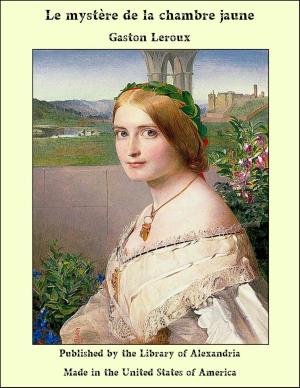| Author: | William Younger Fletcher | ISBN: | 9781465543028 |
| Publisher: | Library of Alexandria | Publication: | March 8, 2015 |
| Imprint: | Language: | English |
| Author: | William Younger Fletcher |
| ISBN: | 9781465543028 |
| Publisher: | Library of Alexandria |
| Publication: | March 8, 2015 |
| Imprint: | |
| Language: | English |
My friend, Mr. Walter Stanley Graves, has in an appendix to this volume compiled a list of the principal sales of libraries in this country from an early period to the present time, which will be found to supply useful information about many of those collectors who are not otherwise mentioned in the book. Mr. Locker-Lampson in the introduction to the catalogue of his library very pertinently remarks: 'It is a good thing to read books, and it need not be a bad thing to write them; but it is a pious thing to preserve those that have been some time written.' To collectors scholars owe a deep debt of gratitude, for innumerable are the precious manuscripts and rare printed books which they have rescued from destruction, and not a few of them have enriched by their gifts and bequests the public libraries of their country. Every lover of books must feel how greatly indebted he is to Archbishops Cranmer and Parker, the Earl of Arundel, Lord Lumley, Sir Robert Cotton, and other early collectors, for saving so many of the priceless manuscripts from the libraries of the suppressed monasteries and religious houses which, at the Reformation, intolerance, ignorance, and greed consigned to the hands of the tailor, the goldbeater, and the grocer. A large number of the treasures once to be found in these collections have been irrecoverably lost, but many a volume, now the pride of some great library, bears witness to the pious and successful exertions of these eminent men. A love of book-collecting has always prevailed in this country, and since the end of the seventeenth century it has become very widely diffused. In the early days of the eighteenth century the Duke of Devonshire, the Earls of Oxford and Sunderland, and several other collectors, employed themselves during the winter months in rambling through various quarters of the town in search of additions to their libraries, and with some of these collectors the acquisition of books became a positive passion. In 1813 Dr. Dibdin thought that the thermometer of bibliomania had reached its highest point, and it would certainly appear to have been very high indeed, judging from the prices obtained at the Roxburghe and other sales of the time. For some years there was a period of depression, which perhaps was at the lowest between 1830 and 1850, but the desire to acquire rare books appears never to have been greater than at the present day, and for the choicest examples collectors are willing to give sums which dwarf into insignificance the prices which excited the astonishment of our fathers. These high prices may possibly be somewhat due to the spirited bidding of the great bookseller we have recently lost, and to the competition of our American cousins; but they are also distinct evidences that the beautiful and interesting volumes which issued from the presses of the old printers have not lost their charm for the bibliophiles of our own time. They have the advantage, too, of causing these treasures to be more valued, and consequently better treated, for it has been well said that nothing tends to the preservation of anything so much as making it bear a high price. A chronological arrangement of the collectors has been adopted for several reasons as the preferable one, but an alphabetical list of their names will be found at the beginning of the volume. It ought also to be observed that accounts of the different libraries rarely mention the number of books contained in them, but when they have been sold by auction I have found by a careful examination of the sale catalogues that on an average each lot may be reckoned as consisting of about a volume and a half
My friend, Mr. Walter Stanley Graves, has in an appendix to this volume compiled a list of the principal sales of libraries in this country from an early period to the present time, which will be found to supply useful information about many of those collectors who are not otherwise mentioned in the book. Mr. Locker-Lampson in the introduction to the catalogue of his library very pertinently remarks: 'It is a good thing to read books, and it need not be a bad thing to write them; but it is a pious thing to preserve those that have been some time written.' To collectors scholars owe a deep debt of gratitude, for innumerable are the precious manuscripts and rare printed books which they have rescued from destruction, and not a few of them have enriched by their gifts and bequests the public libraries of their country. Every lover of books must feel how greatly indebted he is to Archbishops Cranmer and Parker, the Earl of Arundel, Lord Lumley, Sir Robert Cotton, and other early collectors, for saving so many of the priceless manuscripts from the libraries of the suppressed monasteries and religious houses which, at the Reformation, intolerance, ignorance, and greed consigned to the hands of the tailor, the goldbeater, and the grocer. A large number of the treasures once to be found in these collections have been irrecoverably lost, but many a volume, now the pride of some great library, bears witness to the pious and successful exertions of these eminent men. A love of book-collecting has always prevailed in this country, and since the end of the seventeenth century it has become very widely diffused. In the early days of the eighteenth century the Duke of Devonshire, the Earls of Oxford and Sunderland, and several other collectors, employed themselves during the winter months in rambling through various quarters of the town in search of additions to their libraries, and with some of these collectors the acquisition of books became a positive passion. In 1813 Dr. Dibdin thought that the thermometer of bibliomania had reached its highest point, and it would certainly appear to have been very high indeed, judging from the prices obtained at the Roxburghe and other sales of the time. For some years there was a period of depression, which perhaps was at the lowest between 1830 and 1850, but the desire to acquire rare books appears never to have been greater than at the present day, and for the choicest examples collectors are willing to give sums which dwarf into insignificance the prices which excited the astonishment of our fathers. These high prices may possibly be somewhat due to the spirited bidding of the great bookseller we have recently lost, and to the competition of our American cousins; but they are also distinct evidences that the beautiful and interesting volumes which issued from the presses of the old printers have not lost their charm for the bibliophiles of our own time. They have the advantage, too, of causing these treasures to be more valued, and consequently better treated, for it has been well said that nothing tends to the preservation of anything so much as making it bear a high price. A chronological arrangement of the collectors has been adopted for several reasons as the preferable one, but an alphabetical list of their names will be found at the beginning of the volume. It ought also to be observed that accounts of the different libraries rarely mention the number of books contained in them, but when they have been sold by auction I have found by a careful examination of the sale catalogues that on an average each lot may be reckoned as consisting of about a volume and a half















